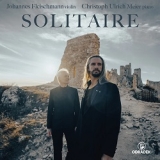Johannes Fleichmann ist ein ganz besonderer Geiger: er spielt mit einer so unwiderstehlichen Rhetorik, einer so packenden Kombination von Klang und Ausdruck, dass man ihm nur fasziniert zuhören kann.
Auf dem Album Solitaire interpretiert er einen Reigen mehr oder weniger unbekannter Werke bekannter Komponisten, und gleich in Jakobs Traum, der Duofassung eines Trios von Joseph Haydn, und in einer Bearbeitung des Wagner-Lieds Träume wird der Hörer von einer hier pulsierend leidenschaftlichen, dort seelenvollen Interpretation gepackt.
Absolut hinreißend, voller sinnlicher Leidenschaft erklingt Liszts Die drei Zigeuner S. 383.
Drei großartig angelegte romantische Stücke von Reinecke, Schumann und Joachim führen zum Brahms-Scherzo, in dem Energie und Poesie sich ideal mischen, ehe Christoph Ulrich Meier dann das Albumblatt von Brahms sehr schön darbietet.
In der schönen Serenade von Zemlinsky wissen die beiden Musiker das Stück durch Geben und Nehmen, durch Hervor- und Zurücktreten zu beleben.
Arnold Schönbergs Stück für Violine und Klavier in d-Moll aus dem Jahren 1893/94 ist recht konventionell und wird hier charmant, aber auch sehr farbig dargeboten.
Sehr in die Moderne weisend erklingt dann Eugène Ysaÿes Sonate für Solovioline, op. 27/5, L’Aurore, mit einer reichen Ausdruckspalette und einem hervorragenden Gefühl für Rhythmus und Struktur. Und weil Ysaÿe hier so modern klingt, ist der Weg zu Konstantia Gourzi: Aria for violin and piano, op. 94 nicht weit. Es ist eine Neuinterpretation einer Arie aus Haydns Puppenoper Philemon und Baucis, die die CD stimmungsvoll und sehr mysteriös beendet.
Johannes Fleichmann is a very special violinist: he plays with such irresistible rhetoric, such a gripping combination of sound and expression that one can only listen to him with fascination.
On the album Solitaire he plays some more or less unknown works of well-known composers, and immediately in Jakob’s Dream, a duo version of a trio by Joseph Haydn, and in an arrangement of Wagner’s song Träume the listener is gripped by a here pulsatingly passionate, there soulful interpretation.
Absolutely ravishing, full of sensual passion is Liszt’s Die drei Zigeuner S. 383.
Three magnificently arranged romantic pieces by Reinecke, Schumann and Joachim lead to the Brahms Scherzo, in which energy and poetry mix ideally, before Christoph Ulrich Meier then presents a very beautiful Albumblatt by Brahms.
In the beautiful Serenade by Zemlinsky, the two musicians know how to enliven the piece by giving and taking, by standing out and stepping back.
Arnold Schoenberg’s piece for violin and piano in D minor from 1893/94 is quite conventional and is presented here charmingly, but also very colorful.
Then, pointing very much into the modern era, Eugène Ysaÿe’s Sonata for Solo Violin, Op. 27/5, L’Aurore is heard with a rich range of expression and an excellent sense of rhythm and structure. And because Ysaÿe sounds so modern here, it’s not far to Konstantia Gourzi: Aria for violin and piano, op. 94. It is a new interpretation of an aria from Haydn’s puppet opera Philemon and Baucis, which ends the CD atmospherically and very mysteriously.
























